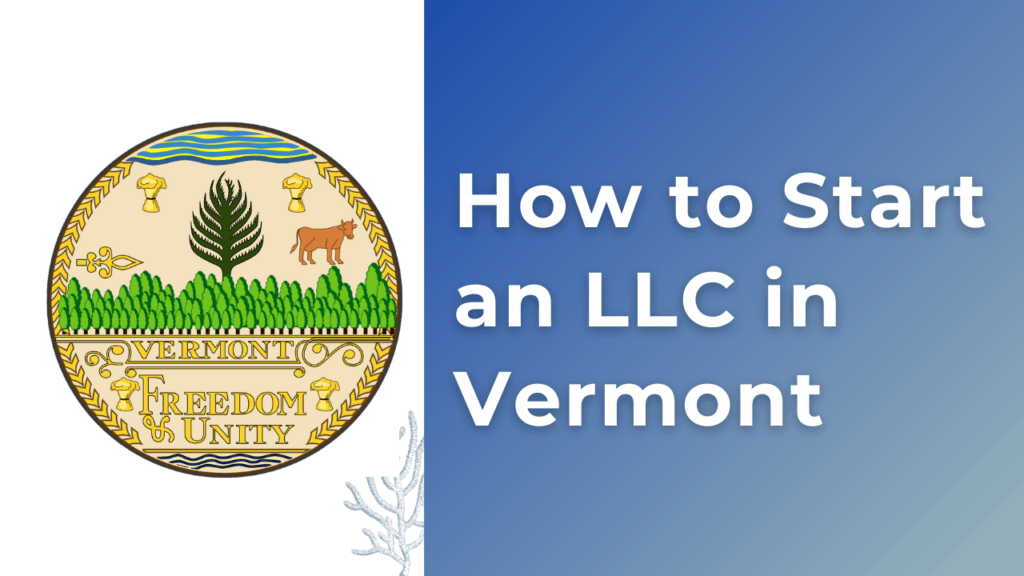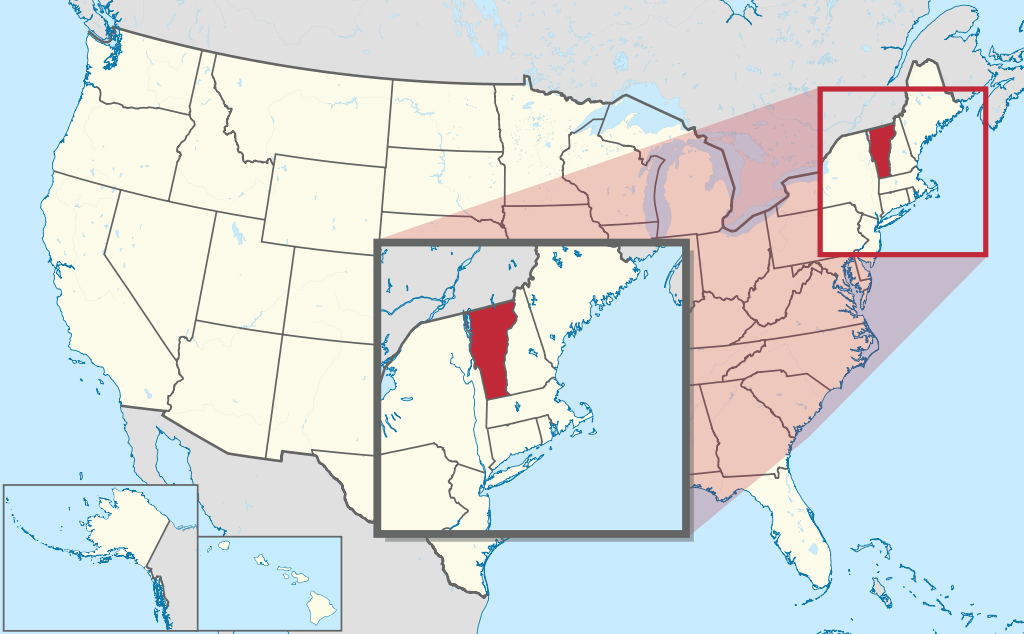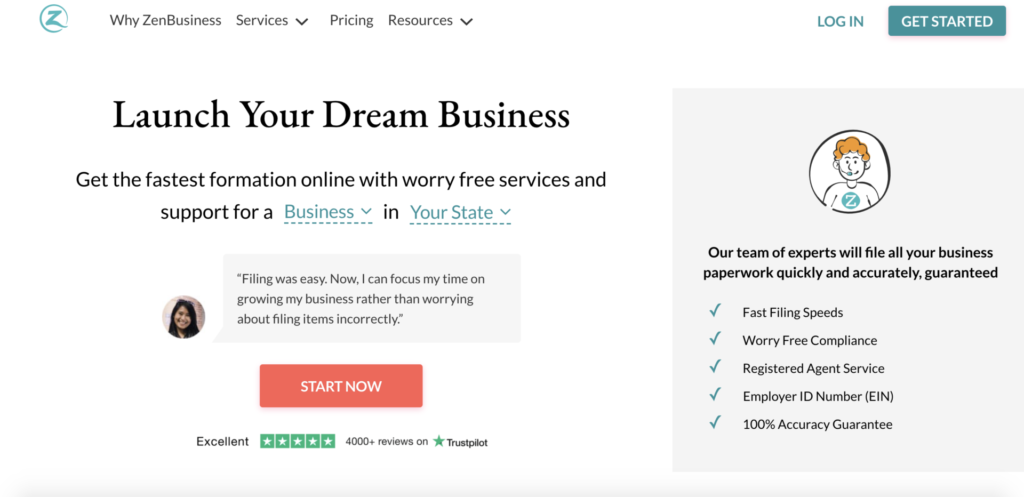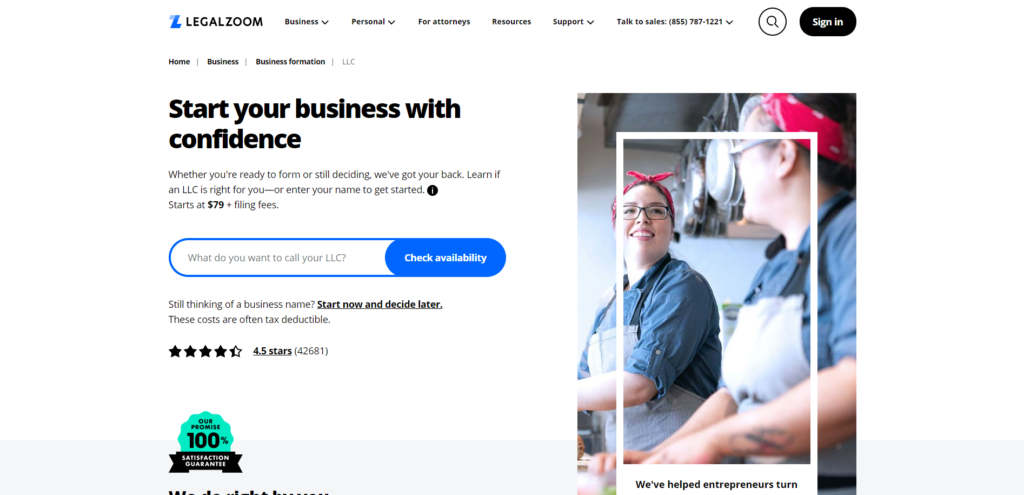
If you need a way to optimize your business operations but lack the excess cash or resources to form a corporation then you should consider forming a Limited Liability Company. An LLC is a great way to ensure your business and personal assets separate in the event that your company is ever sued or runs into financial issues.
In Vermont, you can have your LLC processed in as quick as a day and all for $125.
Forming an LLC in Vermont is easy, just follow out step-by-step instructions:
How to Form an LLC in Vermont – A Step by Step Guide

You can apply for your LLC on your own or through a professional service. While filing on your own isn’t complicated and doesn’t take too much time, you still want to make sure you complete each step as outlined below, ensuring your LLC is set up correctly the first time around.
If you’d rather not handle your business’s legal side, we suggest hiring experts to file all your business paperwork for you (a more worry-free approach).
Otherwise, if you’re a do-it-yourself kind of person, follow these 5 initial steps:
1. Name your Vermont LLC
To form an LLC in Vermont you need to follow specific name requirements set by state law. Your business name needs to be unique, meaning no other company has a similar name.
Name Requirement
Before checking to see if the business name you’d like is available, to abide by Vermont LLC law, make sure the name of your company contains one of the following:
- Limited Liability Company
- Limited Company
- LLC
- L.L.C.
- L.C.
- LC
You can appreciate the word Limited to ‘Ltd.,’ and the word ‘Company’ to ‘Co.’ Your LLC name can be your business name, like Plumbing King L.L.C, or the name of one of your LLC’s members, such as Joe Smith LLC.
Check Name Availability
Once you’ve decided on your name, you need to check to see if it’s available and there’s no other company in Vermont using it. The quick and easy way to do this is through a quick google search using your desired name.
If you don’t find any competing companies, you can move onto the next step – checking your business’s potential name through the Vermont business name search.
If you want to reserve a name, you can do that too by filing an Application to Reserve a Specified Business Name that will reserve your desired name for up to 120 days. It costs $20 to reserve a name. You can apply by mail or through Vermont’s online business portal.
Using a Fictitious Name
If you don’t want to use LLC in your business name, then you can add a fictitious name once your business is registered. Also known as DBA (“doing business as,”) or a trade name, a fictitious name allows you to run your business under a name that’s not the legal LLC registered name.
You can also use a fictitious name if you plan on running several different businesses under your LLC formation.
If you decide to use a fictitious name, you must register it with the Vermont Secretary of State. Registrations are done online or by mail. By registering a fictitious name, you’re legally able to operate under that name, and no other business name can use it.
Once you’ve figured out what your business name is and you’ve made sure it’s still available, the next step is to choose a registered agent who will help you with the legal side of your business.
2. Choose a Vermont Registered Agent
A registered agent is anyone who receives and sends legal documents on behalf of your company. They are the main point of contact between your company and the Secretary of State.
Vermont, an LLC must have a registered agent who lives in Vermont and has a valid street address (not a P.O. box).
An LLC registered agent can be:
- Yourself
- A family member or friend
- A Commercial Registered Agent
Why you should use a registered agent
While the easier route seems to be to have yourself, or one of your LLC’s members, act as the registered agent, there are some benefits in hiring a professional. A registered agent will ensure your business is always in good standing with the state, helping you stay organized and up-to-date. It also adds a layer of protection since they’ll help you in the case of a lawsuit or any penalties/fines.
Once you’ve decided who’s the best person to be your registered agent the next step is to submit your LLC application.
3. File a Vermont LLC Articles of Organizatio
To form an LLC in Vermont, you’re required to fill out the ‘Articles of Organization’ application form and submit it to the state. It costs $125 to register. You can apply online or create an online account and print off the application to mail it in. If you apply online, expect approval within 24 hours, whereas applications sent through the mail will take up to 7 business days.
If you fill out the form with inaccurate information, your writing is illegible, or you skip a section, your application will be refused. Be prepared to include the following information (and always read it over once before submitting):
- Your LLC’s name
- The Type of LLC
- Your LLC’s fiscal year-end
- The purpose of your LLC
- The mailing address of your LLC
- The Name, address, and email of your LLC’s registered agent
- Whether your LLC has members at the time of filing
- Whether your LLC will be member-managed or managed-managed
- All the names and addresses of the principal members/managers
- The name and address of the LLCs organizer
- The signature of the organizer
What’s the difference between member-managed or manager-managed?
Member-managed is if you (and the other owners of your LLC) are responsible for everyday business activities. In contrast, manager-managed is if you decide to hire someone who is not a member to manage your business’s day-to-day activities.
Member-managed is more common for smaller businesses, while larger companies typically use manager-managed. You’d usually only choose manager-managed if you are a passive investor and aren’t involved much in the business.
Once you get approval, you can move onto step 4 – creating an LLC Operating Agreement. If you’re operating your LLC by yourself, skip to step 5.
4. Create a Vermont LLC Operating Agreement
If your LLC has two or more members, it should have an operating agreement. Although it’s not required in Vermont, we suggest creating one to outline how the business is structured and how it will operate among its members (and/or managers).
Some of the sections you’ll typically find covered in an operating agreement include:
- Organization
- Management
- Voting
- Capital distributions
- Distributions
- Dissolution
Again, while this is not a necessary step, as you don’t have to mail it to the secretary of state, it is recommended if your LLC has more than 2 members. It helps clarify the rules of your LLC and makes sure they are legally documented.
After you’ve agreed and created an LLC Operating Agreement, the next step is to create your unique employer identification number.
5. Apply for your Vermont LLC Employer Identification Number (EIN)
Once your LLC is approved, you’ll need to get an employer identification number (EIN).
An EIN is a federal tax ID number that registers you with the Internal Revenue Service (IRS). This number identifies your company when filing taxes.
How to register for an EIN:
– Apply online or,
– fill out the Employer Identification Number form and fax it to 855-641-6935, or mail it to:
Internal Revenue Service,
Attn: EIN Operation,
Cincinnati,
OH, 45999
If you apply online, you’ll get instant approval. If you apply by fax, it takes up to 4 business days, whereas mailing can take up to 4 weeks. Applying for your EIN is completely free!
Vermont LLC Registration – Final Checklist & Summary
Ready to get started? Use this simple checklist to make sure you’ve dotted your i’s and crossed your t’s!
- Name your LLC – Your business name must have ‘Limited Liability Company’ or ‘Limited Company’ in its name, or the abbreviation(s) LLC, LC, L.L.C, or L.C. The word ‘Limited’ can be shortened to Ltd, and the word ‘Company’ can be shortened to Co. All Vermont LLCs must have a unique name, so check the business name database to ensure your LLC name isn’t already taken.
- Choose a Registered Office – A registered agent is a person who receives and sends legal documents on behalf of your company. It can be you, a friend or family member, or a commercial registered agent.
- File a Vermont LLC Articles of Organization – You need to submit the ‘Articles of Organization’ application online or through the mail in order to register and form your LLC. We always recommend applying online as the approval process is much quicker (24 hours compared to 7 business days when applying by mail). The application costs $125.
- Apply for your Vermont LLC Employer Identification Number (EIN) & File your Tax Registration Form – Once you get approval for your LLC, you need to apply for an employer identification number (EIN) through the IRS. This number identities your company when filing taxes. You can apply online for free, and approval is instant.
- Create Vermont LLC Operating Agreement – If your LLC has two or more members, you should create an LLC operating agreement that outlines how the business is structured, who is responsible for what, and how much of the LLC each person owns. You don’t have to send your operating agreement to the Vermont state, but you should have one, so everything is documented and signed by all members.
Always double-check your LLC information is correct before submitting any paperwork. You want to avoid simple mistakes and ensure your business is set up correctly from the get-go. If it’s within your budget, we recommend using a formation service to help form your LLC. They can act as your registered agent and make sure your company is always in good standing. Just make sure you do your homework and choose one of the best LLC formation services for your business.
Our first recommendation is to go with ZenBusiness, an LLC creation service that holds your hand from start to finish. Packages start as low as $49.
How To Apply for a Vermont LLC Online
Now that you know the exact steps on what’s needed to form your LLC, it’s time to start the application process. There are two ways of going about this
1. Do it Yourself
Taking the DIY route is a good option if your budget is tight or you’ve previously opened an LLC and understand how it works
2. Use an Online Formation Company
Using an online formation company is a better option if it’s your first time opening up an LLC and if it’s within your budget (formation services cost anywhere between $49 – $199). This is typically a better choice if you want to avoid headaches and have peace of mind knowing professionals handle everything for you.
If using a professional service is more up your alley, here are our top 3 recommendations:
ZenBusiness

ZenBusiness built its platform to meet the needs of your business throughout its lifetime. When you pay for their services, you’ll receive a personalized dashboard for your business to store documents, receive alerts, and manage your website.
ZenBusiness charges work on a tier system. There are three different tiers with pricing as follows:
- The Starter = $49 annually
- The Pro = $199 annually
- The Premium = $299 annually
ZenBusiness Review
IncFile

IncFile provides you with a full suite offering startup services to best support your business formation.
Their pricing model also depends on the state you are filling. You can generate a personalized quote on their website by entering the necessary information about your business.
IncFile Review
Legal Zoom

LegalZoom is an online legal service provider that helps you to be able to create legal documents without having to pay the expensive lawyer fees. Some of the services they provide assistance to includes business formation, copyrights, and trademarks.
LegalZoom has many different pricing options available. For their LLC service, pricing begins at $79 + the allotted state fee.
LegalZoom Review
After Starting Your Vermont LLC
You’re approved – now what? The journey doesn’t stop here – there’s still a handful of things you need to do to get your business off the ground. We recommend ticking off the following items to make sure your LLC gets off on the right foot.
Purchase A Domain For Your Business
Even if your business is local, having an online presence is essential in creating trust, professionalism, and a way for people to find you. If you haven’t already thought about getting a website, now’s the time. In a tech-saturated world, you need a domain to not only attract new customers but help create a good first visual impression of what your business does and how it can help.
Get A Business Phone Number
Since your business is now an approved Vermont LLC, you should think about getting a business phone number. Having a business number is a great way to show professionalism to your clients and customers. It makes you more serious and, more importantly – more trustworthy.
There are various online phone services you can go with, or you could go the traditional route and open an account through a local branch. You can get a local number or a 1-800; the options are endless!
Open Your Vermont LLC Business Bank Account
You’ll want to open a business account that’s separate from your personal banking. This will not only make accounting easier, but you won’t have to worry about your finances mixing in with your business finances
USA Business Bank Accounts
If you already have online banking, it might be easier to open a business account through your current bank, so all your banking (although in separate accounts) will be accessible in the same place. If you prefer to open something new, keep these checking accounts in mind:
Chase – Free checking account with no extra fees – as long as you keep a $1,500 minimum balance.
BlueVine – Free checking account with mobile banking and a debit MasterCard.
Bank Novo – Open a free checking account with Free transfers and free ATM fees.
Vermont Federal Credit Union – Open a simple business checking out to help solve your company’s cash flow needs.
VSECU – Choose from a variety of different checking accounts to suit your business’s specific needs. Open an account with no monthly fees or opt for one that earns dividends.
Union Bank Vermont – If you only have a few transactions a month, then consider opening a business checking account through the Union Bank of Vermont. You’ll get overdraft protection, online and mobile banking, and no charges on your first 250 debits or credits.
Along with your business checking account, you should apply for a business credit card too. Having a business credit card is an excellent way to establish your business credit score (which may help if you ever need a loan). It also makes it easier for online purchases, and again, it will keep your personal and business finances separate.
Find Accountant/Buy Accounting Software
Taxes get complicated fast and can be a burden to handle. We recommend getting an accountant or using accounting software to ensure all your spending actions are tracked (payroll, bills, invoices, receipts, etc.). Here are some popular options to look into:
Wave – Free invoicing & accounting software with credit card processing & payroll services.
Intuit Quickbooks – Online accounting software to track expenses, customize invoices, and run reports.
Freshbooks – Accounting software to send invoices, track time, manage receipts, expenses, and accept credit cards.
Directory of Federal Tax Return Preparers with Credential – If you want to use a local tax specialist, you can search for a certified public accountant (CPA) through the IRS online directory.
Having all of your business reports in one spot is highly beneficial, so you can keep an eye on your cash flow. To run a successful business, you will need to analyze how your business performs and narrow down what’s working or what isn’t working. Finding areas for growth will ensure success.
Don’t Forget to File an Annual Report
All LLCs operating in Vermont are obligated to submit an annual report with the Vermont Secretary of State Corporations Division. Reports are due within 3 months of the LLC’s fiscal year (i.e., if the fiscal year ends in December, reports are due between January 1st and March 31st).
Your first report is due at the end of your first year in business (no matter what month your LLC was formed). For example, if your LLC was approved and formed in August 2021 and your fiscal year ends in December, then you’d need to submit your first report anytime between January 1st and March 31st of 2022.
Reports may be filed online and cost $35. The state will send a reminder to file your report to your registered agent. If you forget to file, there’s a grace period of 3 months (so June 30th if your fiscal year ends in December); however, if you go past the grace period, the state has the right to dissolve your LLC.
Notify Vermont Of Any Changes You Make To Your LLC
If at any time you make changes to your LLC you need to inform the state. If you’re using a registered agent they can do this for you. If you’re going about this alone, you can update changes through Vermont’s business portal or through your registered agent.
8 Benefits of Forming an LLC in Vermont
Setting up an LLC in Vermont makes sure your business finances stay separate from any personal finances and that each member’s personal possessions are safe. It’s a great business entity for small, medium, or large businesses as it gives you the freedom of a sole proprietorship or partnership with the protection of a corporation. Best of all, it’s easy to get (approval is instant), and it won’t cost you an arm and a leg. Some of its major benefits include:
1. Protect Your Personal Assets
The LLC will have its liability that does not automatically extend to the owners, unlike a sole proprietor, where you are legally responsible for everything. That means Vermont LLC protects the liabilities and debts incurred by the business. In most situations, your assets, such as your car, home, or savings, will never be at risk if your Vermont LLC is faced with lawsuits or bankruptcy.
2. Benefit From Business Profit Taxation
In an LLC in Vermont, your profits and losses can pass through to your income without having to have corporate taxation.
3. Simple to Create and Maintain
The formation of a Vermont LLC requires minimal paperwork and requirements. They are known for being easy to start and simple to maintain.
4. Minimal Restrictions
Your business matters can be managed by more than one owner or member while still being one main business to the public. This means all decisions and transactions behind the scenes can be equitably distributed while presenting one entity as you move forward.
5. Heighten Your Credibility
As you move forward, your VermontLLC will continuously be recognized as an entity. People and other businesses prefer doing business with a legitimate entity because it shows your level of professionalism.
6. Gain Access to Business Loans
When you form your Vermont LLC, you will obtain a DUNS number and build your business credit, helping you to further build upon your business.
7. Benefit From Flexible Profit Distribution
In an LLC, you are not required to spread the distribution of profits equally across the owners. You have complete control over profit distribution in your Vermont LLC.
8. Good For Any Kind Of Business
An LLC business structure in Vermont is an excellent choice for both medium and higher-risk level businesses. You might always want to consider opting to go with an LLC if you have a significant amount of personal assets to protect from your company. And lastly, LLCs are great for owners who are interested in paying lower tax rates than corporations.
Conclusion
A Limited Liability Company is a great way to legally structure any business in Vermont. An LLC will let you keep your personal and business assets separate, meaning you won’t be personally accountable for the business’s debts and liabilities. You will also have added protection in case your business ever gets sued. Essentially, an LLC will give you legal protection (similar to that of a corporation) while still allowing you to operate it as a sole proprietorship.
If it’s within your means, it’s a good idea to use a formation service, like ZenBusiness, which can handle the entire legal side of your business for you. You want to make sure everything is submitted correctly and accurately, otherwise, your LLC is at risk of being rejected or formed incorrectly.
File Your Dream Business with ZenBusinessFAQ – Forming Vermont LLC
There are several different steps you’ll need to take to form your LLC legally. It’s a lot of information to take in and can get confusing. To help out, we’ve compiled some answers to the most frequently asked questions:
What are LLCs, and why are they important?
An LLC is a Limited Liability Company. It’s a business structure used to protect your assets, like your house, your car, or even your savings. No matter what happens to your business (lawsuits, bankruptcy, etc.) your assets are kept safe.
How much does it cost to start an LLC in Vermont?
It costs $125 to file the ‘‘Articles of Organization’ application that registers your LLC with the state.
How long does it take to form an LLC in Vermont?
If you apply online, it takes up to 24 hours, whereas applications sent by mail take around 7 business days.
Can you start an LLC on your own?
Yes, you can start forming an LLC on your own by following the step-by-step instructions provided in this article. For additional help, look to hire an all-around service provider.
Do you need a lawyer to start an LLC in Vermont?
No, you can start an LLC without a lawyer just be prepared to file and report everything on your own. If you’re not interested in getting a lawyer but want to make sure everything is filed correctly, use an online business formation service, like the ones listed in this article, with ZenBusiness as our #1 recommendation.
Does an LLC need to make money?
No, an LLC doesn’t need to make profits, but if you’re claiming tax deductions with no income, the IRS will likely audit your business.
What are the downsides to having an LLC?
There are pros and cons to forming an LLC. The pros are tax reductions, protecting your personal assets, and creating credibility for your business (and possible future business loans). The main con of an LLC is you’re considered self-employed. This is a disadvantage as you’d be taxed under self-employment and responsible to pay Social Security and Medicare taxes. The amount you’d be required to pay depends on your business’s total net earnings.
